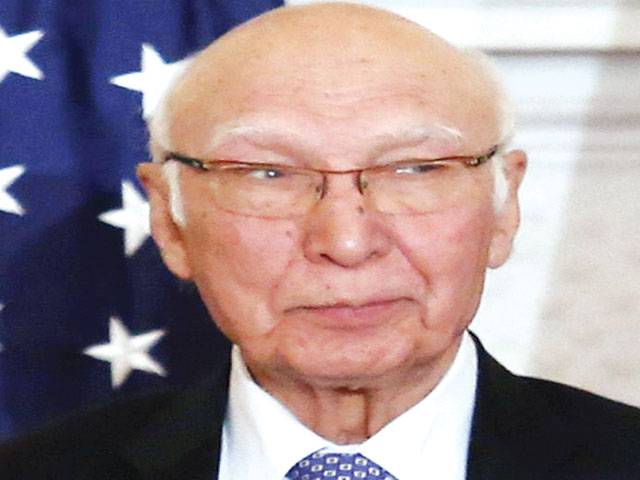LONDON - Admitting that peace in the short run is unlikely, Adviser to the PM Sartaj Aziz has said that going on a full-scale offensive in Pakistan requires being willing to accept the consequences of blowback ‘not just in the tribal areas’, but in the rest of the country.
In an interview with CNN, Sartaj Aziz said “The normal policy of talk, talk, fight, fight, is something which has been tried in the past, and has worked well.”
“There are elements in Taliban who know that there is no longer the situation of the nineties when they could all run Afghanistan,” he said.
“So these pressures could persuade them to come to the negotiating table. The critical step will be for the Afghan government, which will be led by a new president in a matter of months, to offer some kind of power sharing to the Taliban, something more than they can get in the battlefield.
“If you ask my objective assessment, I don’t see major reconciliation and I don’t see a very large scale civil war, but the middle alternative of the status quo continuing - a simmering insurgency.”
About going on a full-scale offensive in Pakistan, he said “You need a large political consensus that you have tried all options and now this is the way to do it. I think we have achieved now that large consensus, in the past few months.
That does not necessarily mean that Pakistan is on the verge of a full-scale offensive, but it does mean that the government will be able to distinguish those who want to talk versus those who don’t want to engage in dialogue.” There may not be peace in the short run, he admitted.
“They have a lot of capacity to create mayhem in many cities, but that is a price that we’ll have to pay to restore peace.”
Responding to a question, Aziz said Pakistan is charting a new future of non-interference with its neighbours. “Our policy, Pakistan’s policy, is non-interference and no favourite,” Aziz told CNN.
“Afghanistan has been a theatre of great power rivalries, great power games for a long time,” he said. “One of the apprehensions of the Afghan government and President Karzai was the Taliban have a better chance because Pakistan is supporting them, and we have convinced him that is not in our security interest.”
About drone attacks, Aziz said “The damage, the negative fallout of drone attacks far exceeds any advantage you may get in getting a high-value target. Our basic point to President Obama when Prime Minister Nawaz Sharif met him was that it is becoming counter-productive.”
The attacks have dramatically tapered off, he said, but admitted that the US “will not formally say that we are ending drone strikes.”
America has, he told CNN, bought Pakistan’s, and the international community’s argument that the drone strikes are the wrong policy.
To a question, he said “If your economy is weak you can’t achieve anything else, not unemployment can be solved, politics can’t be solved, your sovereignty can’t be protected and your position gets much weaker. And that requires, apart from energy crisis and so on and so forth, peaceful neighbourhood.”
“That is why the policy of having peace with Afghanistan and peace with India are a critical priority.”
While talking to BBC, Aziz said that despite a recent lack of US drone strikes, there has been no formal deal for the US to stop attacking Pakistani soil.
He also said the US had not stopped the drone attacks as a facility for Pakistan to hold talks with Taliban.
He said Prime Minister Nawaz Sharif during his visit to US had told President Obama about ineffectiveness of drone attacks. “Although the US has not announced formally to stop drone attacks and it will not do so, it seems Obama has understood Pakistan views on use of unmanned aircraft.”
To another query, Aziz said it would be endeavour of Pakistan to bridge the gulf between Saudi Arabia and Iran to ease tensions between the two countries.
He said Pakistan is following a neutral policy on Syria in line with UN resolutions. He said Pakistan-Iran gas pipeline project is intact, but due to sanctions, the time limit for its implementation will have to be reset.
Friday, April 19, 2024
Peace in the short run unlikely: Sartaj
Says no deal for Washington to halt drone strikes

Caption: Peace in the short run unlikely: Sartaj
President calls for meaningful dialogue to end polarisation
April 19, 2024
KP minister briefed on issues about sales tax on services
April 19, 2024
64th anniversary of freedom fighter Mirzali Khan marked
April 19, 2024
893,000 students appear in SSC exams in KP
April 19, 2024
Hepatitis Challenge
April 18, 2024
IMF Predictions
April 18, 2024
Wheat War
April 18, 2024
Rail Revival
April 17, 2024
Addressing Climate Change
April 17, 2024
Justice denied
April 18, 2024
AI dilemmas unveiled
April 18, 2024
Tax tangle
April 18, 2024
Workforce inequality
April 17, 2024
New partnerships
April 17, 2024
ePaper - Nawaiwaqt
Advertisement
Nawaiwaqt Group | Copyright © 2024





